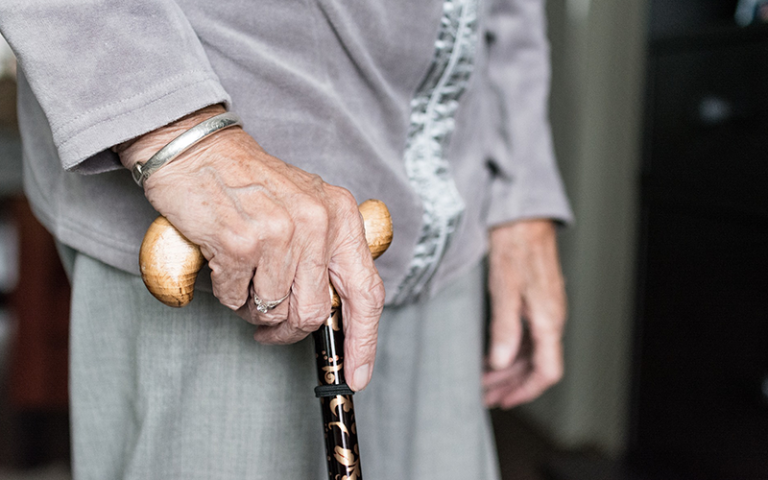People with disabilities more likely to be depressed, anxious and lonely during pandemic
21 April 2021
Older people in England with physical disabilities were more likely to have worse mental health and to feel lonelier during the Covid-19 pandemic than able bodied people - with more support required to address this during and after the pandemic - according to a new UCL study.

Research published today in The Lancet Public Health found that those with a disability experienced greater increases in depression and anxiety than people without a disability, as well as poorer psychological wellbeing, quality of life and sleep, in addition to lower levels of social contact.
The research team analysed data from the English Longitudinal Study of Ageing (ELSA), collected in 2018–19 and June–July 2020, from 4,887 people aged 52 years and older living in England. Disability was assessed by looking at whether respondents had difficulties with activities of daily living (described as ADL disability), such as dressing or bathing, as well as impaired mobility, while mental health was assessed online or by computer-assisted telephone interviews.
The researchers found that around 29% of respondents with a disability had significant depressive symptoms during the pandemic period compared with 16% of those without a disability. Almost 16% of people with ADL disability were found to have significant anxiety symptoms, contrasting with 7% of able-bodied people. These analyses took account of pre-pandemic differences in mental health, along with socioeconomic status and chronic pain.
The study also revealed worse sleep quality for those with a disability, with disturbed sleep reported for around 46% of those with ADL and mobility disability, compared to 39% of participants without disability.
As well as experiencing worse mental wellbeing, the researchers found that those with a disability were more likely to be socially isolated, with less social contact with friends and family - both through real-time communication, such as video or phone calls, and written forms of communication, including emails and letters. While loneliness levels were substantial in all participants in the study, they were 7% higher among those with a disability, at 39%.
The authors found that shielding had an impact on levels of loneliness, with people with disabilities more likely to have been instructed to shield; 26% of respondents with mobility impairment were instructed to shield, compared to 15% of people without disability. The authors note that shielding appeared to contribute to loneliness differences in respondents with and without physical disability, with additional enforced isolation heightening loneliness among disabled people
Study lead author, Professor Andrew Steptoe, (UCL Department of Epidemiology and Public Health) said: “People with physical disabilities have already been identified as being particularly vulnerable during the pandemic, with mobility problems potentially limiting access to health care services, social services, and informal care, while the presence of other medical conditions increases the danger of severe outcomes following infection. However, our study shows that these groups are not only more vulnerable to the impacts of the virus and the pandemic at large, but also to the containment measures put in place to prevent its spread.
“The findings provide further evidence for the disproportional impact on people with disabilities in the early months of the Covid-19 pandemic, in terms of both mental health and quality of life. In our study, older physically disabled people were less likely to be married or have a partner than the able bodied, and they also had lower levels of social contact with family and friends outside their household during the pandemic. It’s likely that this lower social contact level compounded the experiences of loneliness, depression and impoverished quality of life.”
Study co-author, Dr Giorgio Di Gessa, (UCL Department of Epidemiology and Public Health) said: “We already know that people with disabilities tend to have poorer mental health than non-disabled people. But we were able to show that their distress was greater during the Covid-19 pandemic even when pre-pandemic differences were taken into account. Our findings indicate that more attention needs to be paid to emotional and social outcomes for disabled people and emphasises the importance of supporting them during and after periods of epidemic illness and enforced social isolation.
“As we come out of the pandemic, it’s vital that these neglected groups receive special attention to not only address their physical needs but also attend to the disproportionate emotional consequences that the pandemic has had on them. It’s crucial that health and social care providers are able to put care packages in place both during and after the pandemic that take into account the importance of maintaining wellbeing in this vulnerable sector of society.”
The study was funded by the Economic and Social Research Council/UK Research and Innovation, National Institute on Aging, National Institute for Health Research.
Links
- Full study in The Lancet Public Health
- Professor Andrew Steptoe's academic profile
- Dr Giorgio Di Gessa's academic profile
- UCL Department of Epidemiology and Public Health
- Faculty of Population Health Sciences
Image
Image source: Sabine van Erp on Pixabay
Media contact
Evie Calder
Tel: +44 20 7679 8557
 Close
Close

